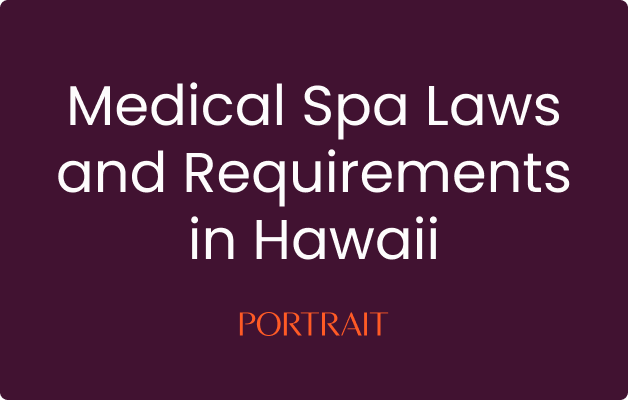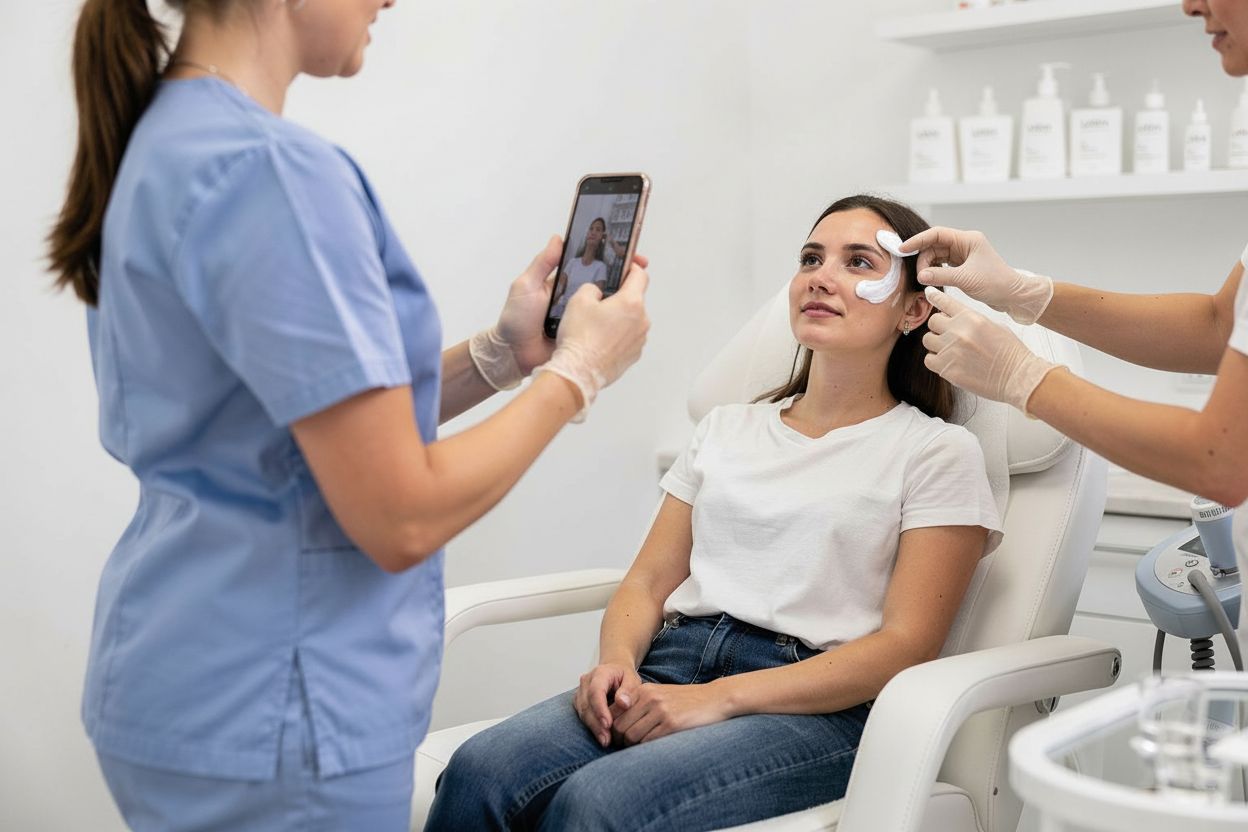Medical Spa Laws and Requirements in Hawaii

Empowering Professionals at Every Stage
Portrait offers strategic expertise to help you make informed decisions and achieve long-term success.
Book Intro CallIn Hawaii, a medical spa is a licensed healthcare facility where ownership is restricted to licensed physicians. This guide provides a clear overview of the medical spa laws in Hawaii to help you operate your clinic with confidence and maintain compliance.
How Medical Spa Laws Work in Hawaii
In Hawaii, a medical spa is defined as a healthcare facility providing non-surgical aesthetic treatments, which sets it apart from a traditional day spa. The core distinction is that med spas perform medical procedures, such as Botox injections and laser therapies, that require professional oversight. These stricter med spa regulations exist to protect patient safety and ensure all services are performed by appropriately licensed medical professionals.
The primary governing body for the facility itself is the Hawaii Department of Health (DOH), which provides the license to operate. In addition, individual practitioners like physicians and nurses must hold current licenses from their respective professional boards. This dual-level oversight ensures that both the business and its staff meet all requirements for med spa compliance.
Medical Spa Requirements in Hawaii
Understanding Hawaii's medical spa requirements is fundamental to building a compliant and successful practice. We will cover the critical aspects of state law, including who can own a med spa, the defined scope of practice for your team, and specific advertising guidelines. Adhering to these med spa regulations, from facility licensing to how you market your services, protects your business and builds patient trust.
Medical Spa Ownership & Business Structure Requirements in Hawaii
In Hawaii, medical spa ownership is restricted to licensed physicians. This regulation directly impacts who can open a med spa and ensures that medical oversight is embedded in the business from the top down. These medical spa ownership laws Hawaii has in place are critical for maintaining med spa compliance.
Because of this physician-only rule, non-physicians cannot own a practice, and the use of a Management Services Organization (MSO) is not specified as a viable alternative. While there is some debate over the state's formal stance on the Corporate Practice of Medicine doctrine, the practical effect is a physician-led ownership model. The regulations do not, however, mandate a specific business entity type for spas in Hawaii.
Regardless of ownership, a designated medical director who is a licensed physician is one of the key medical spa requirements in Hawaii. This individual is responsible for supervising all medical treatments and ensuring services are delivered safely. This oversight is fundamental to the compliant operation of all medical spas in the state.
Facility, Licensing, and Compliance Requirements in Hawaii
To open a med spa in Hawaii, you must first secure a facility license from the Hawaii Department of Health (DOH). This is a key part of the medical spa requirements Hawaii enforces, ensuring your clinic meets state standards. Additionally, all procedures must be performed by licensed professionals under the supervision of a designated medical director, who must be a licensed physician.
As medical facilities, med spas in Hawaii must adhere to federal regulations, including OSHA for workplace safety and HIPAA for patient privacy and recordkeeping. These med spa regulations are critical for maintaining med spa compliance and protecting both your staff and patients. Furthermore, carrying malpractice insurance is a mandatory legal requirement for all medical spas in the state.
When marketing your services, Hawaii's advertising rules require complete transparency to build patient trust. All advertisements must avoid misleading claims and clearly state the practitioner’s qualifications along with any potential service risks. Following these guidelines is essential for compliant advertising and helps you build a reputable practice.
Who Can Perform Medical Spa Procedures in Hawaii?
In Hawaii, procedures like neurotoxin injections and laser treatments are considered medical, requiring strict adherence to the scope of practice for med spa compliance. The medical spa laws in Hawaii dictate that all services must be performed by appropriately licensed professionals under the supervision of a physician medical director. Understanding who can perform which services is a critical component of the medical spa requirements Hawaii enforces.
According to some med spa regulations, physicians and physician assistants (PAs) can perform services like Botox, dermal fillers, and laser treatments. However, other legal interpretations suggest that registered nurses (RNs) may perform Botox injections with an order from a physician, PA, or nurse practitioner. There is also conflicting guidance on who can open a med spa, with some sources indicating nurse practitioners may be able to own and operate their own practice.
The scope of practice for spas in Hawaii also includes services like microneedling, chemical peels, and radiofrequency therapy, which must be performed by licensed medical professionals. Specific guidance on IV hydration law in Hawaii is not clearly defined, so clinics should proceed with caution and seek legal counsel. Ultimately, all practitioners must hold the appropriate licenses for their profession to perform any medical procedure.
Laser & Energy Device Regulations in Hawaii
Hawaii’s med spa regulations do not offer a specific legal definition for lasers or energy devices, but treatments like laser hair removal and radiofrequency therapy are considered medical procedures. This classification is a critical part of the medical spa requirements Hawaii enforces, directly impacting your clinic's med spa compliance. Understanding this is fundamental for all spas in Hawaii.
To adhere to the medical spa laws in Hawaii, only physicians and physician assistants (PAs) may perform these energy-based treatments. The state does not outline specific training or registration requirements for laser technicians, nor does it mandate reporting for adverse events from these devices. Therefore, your medical director's oversight is essential for maintaining safety and compliance, as general medical liability rules still apply.
Medical Spa Enforcement, Penalties & Risk Management in Hawaii
Failing to adhere to the medical spa laws in Hawaii can expose your practice to significant penalties and legal risks. For spas in Hawaii, maintaining med spa compliance is not just about following rules—it's about protecting your investment, your reputation, and your patients. Understanding the enforcement actions you could face is the first step toward building a resilient and trustworthy clinic.
State authorities, including the Department of Health and professional licensing boards, take violations of med spa regulations seriously. Enforcement actions can range from cease-and-desist orders that halt your operations to substantial fines. In more severe cases, individual practitioners may face disciplinary action from their respective boards, which could include license suspension or revocation. These penalties underscore the importance of meeting all medical spa requirements Hawaii sets forth, which can differ from med spa laws by state.
Many compliance issues arise from a few common missteps. To help you stay compliant, here are some frequent mistakes to avoid:
- Improper Delegation: Assigning medical procedures to unqualified staff
- Unlicensed Practice: Operating or performing services without the required state licenses, a direct violation of rules governing who can open a med spa
- Misleading Advertising: Using false claims or failing to disclose treatment risks
- Inadequate Supervision: Lacking proper oversight from a designated medical director
Proactive risk management is your best defense. Here are some practical steps for maintaining med spa compliance:
- Conduct Regular Audits: Periodically review protocols and documentation against current medical spa laws in Hawaii
- Prioritize Staff Training: Keep the team current on scope of practice and licensing requirements
- Maintain Detailed Records: Document patient consents, treatments, and staff credentials
Stay Compliant with Portrait Care in Hawaii
Operating a compliant medical spa in Hawaii requires careful attention to several key areas. This includes confirming physician-only ownership, securing a facility license from the Department of Health, and appointing a qualified medical director to oversee all procedures. It is also vital to maintain strict adherence to the scope of practice for all staff, manage patient records according to HIPAA, and follow transparent advertising guidelines.
Please note that this guide is for informational purposes and does not constitute legal advice. We strongly encourage you to consult with a qualified healthcare attorney to address your specific circumstances.
At Portrait, we provide the technology and support to help you run a safe and successful clinic. You can learn more about opening a compliant med spa with our dedicated resources. Discover how our all-in-one platform can support your growth by scheduling a demo today.
One Platform.
Everything You Need.
Everything You Need.
Portrait combines the technology, support, and savings to run and scale your modern medical wellness business.
Book Intro Call
Stay Connected with Portrait Care
Subscribe to our email list and receive the latest insights, updates, and exclusive content delivered straight to your inbox.




![Who Can Own a Medical Spa? [State by State Guide]](https://cdn.prod.website-files.com/67981e0672f9e49c5b9cb890/69869b11472946b6ec9fe1f0_1770427418079.jpeg)
